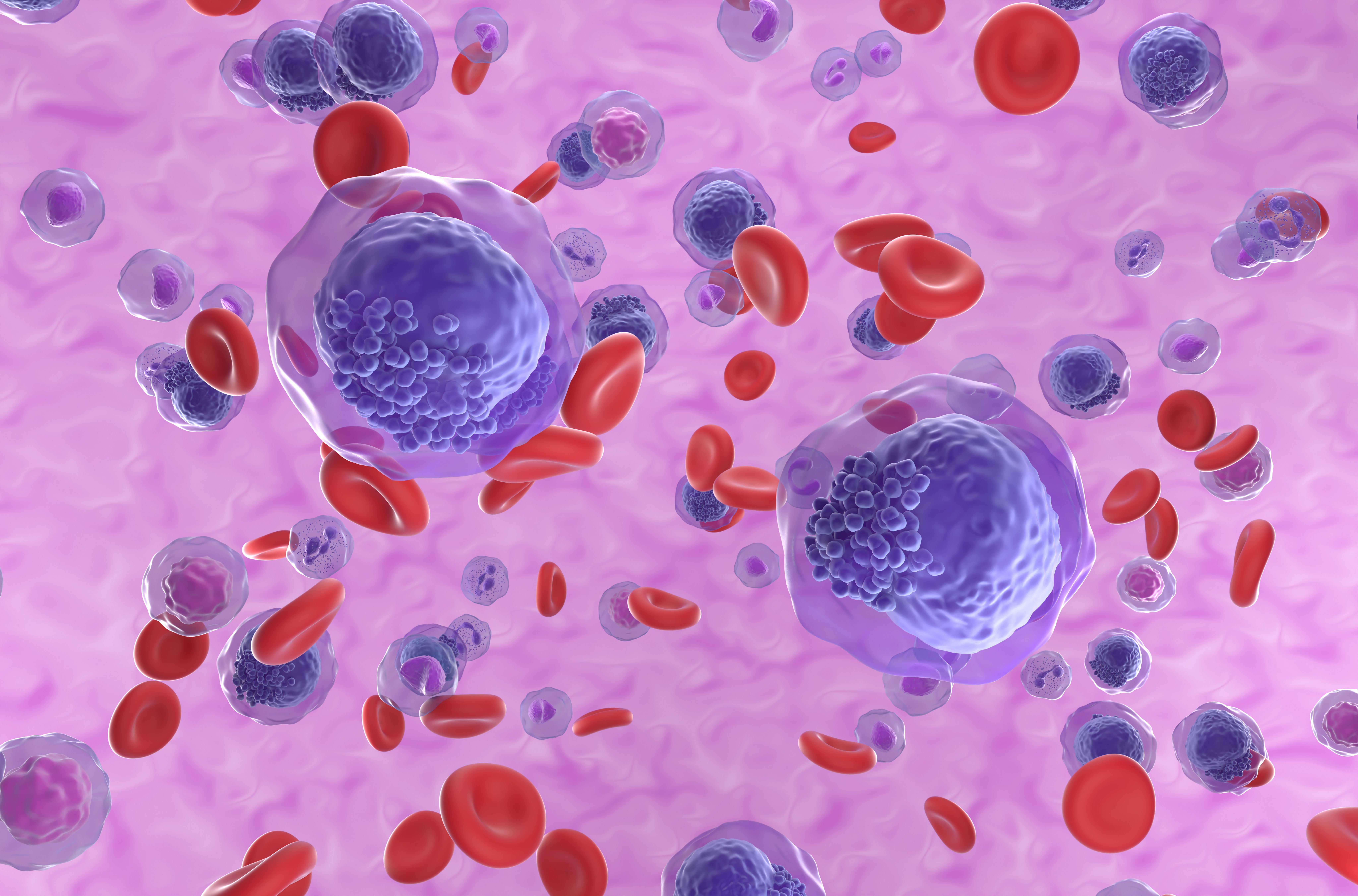Revumenib for NPM1-Mutant AML Succeeds in Pivotal Trial
In the phase 2 AUGMENT-101 trial, revumenib met its primary end point by achieving a complete remission or complete remission with partial blood count recovery in relapsed/refractory NPM1-mutant acute myeloid leukemia.
Acute myeloid leukemia (AML) cells: © LASZLO - stock.adobe.com

Positive results from the phase 2 AUGMENT-101 trial showed that revumenib (SNDX-5613), an oral Menin inhibitor, achieved a 23% complete remission (CR) or CR with partial blood count recovery rate (CRh; 15/64; 95% CI, 14%-36%; P =.0014) in efficacy-evaluable adult patients with relapsed/refractory (R/R) NPM1-mutant (mNPM1) acute myeloid leukemia (AML).1
In phase 2 of the AUGMENT-101 study, the efficacy evaluable population comprised 64 patients with R/R mNPM1 AML who were heavily pretreated. Patients had a median age of 65 (range, 19-84). Among those included, 12 patients achieved a CR, and 3 achieved a CRh. The median duration of response was 4.7 months (95% CI, 1.2-8.2), with 3 patients still in response at data cutoff.
Minimal residual disease (MRD) was evaluated in 14 of the 15 patients achieving CR/CRh, with 64% (9/14) becoming MRD-negative. The overall response rate (ORR) was 47% (30/64; 95% CI, 34%-60%). Of these responders, 17% (5/30) underwent hematopoietic stem cell transplant (HSCT), and 3 resumed revumenib post-transplant.
“Relapsed or refractory mNPM1 AML is a very challenging disease with a poor prognosis and an urgent need for new treatments,” said Eytan M. Stein, MD, chief, leukemia service, Memorial Sloan Kettering Cancer Center, in a press release. “The positive results for revumenib in this heavily pretreated population, which included more than 75% who previously failed venetoclax (Venclexta), are very encouraging. In particular, the robust rates of overall response, including deep molecular remissions and low discontinuation rates, highlight the tremendous promise of revumenib in the treatment of R/R mNPM1 AML patients.”
The safety analysis of the phase 2 portion of the AUGMENT-101 trial included 84 adult and pediatric patients with R/R mNPM1 AML. Revumenib’s safety profile in this group aligned with prior data.
Treatment-related adverse events (TRAEs) led to discontinuation in 5% (4/84) of patients. Grade 3 or higher TRAEs occurring in over 10% of patients included QTc prolongation (21%), anemia (14%), febrile neutropenia (13%), differentiation syndrome (13%), and decreased platelet counts (11%).
Eleven percent (9/84) of patients experienced grade 3 treatment-related differentiation syndrome, with 2% (2/84) experiencing grade 4. No grade 5 cases were observed. Grade 3 QTc prolongation was seen in 19% (16/84) of patients, with 2% (2/84) experiencing grade 4, and no patients experiencing grade 5 cases.
"We are thrilled to report positive pivotal data in R/R mNPM1 AML patients treated with revumenib, which has shown compelling and notably consistent results across treatment settings for both mNPM1 AML and KMT2A-rearranged acute leukemias," said Michael A. Metzger, chief executive officer of Syndax, in a press release. "With the anticipated FDA approval of revumenib for the treatment of R/R KMT2A-rearranged acute leukemias this quarter, and this second positive pivotal data readout, we are well-positioned to meaningfully impact the estimated 40% of AML patients with these 2 genetic alterations."
About Revumenib
Revumenib is an oral, small molecule inhibitor that targets the menin-KMT2A binding interaction and is being developed to treat KMT2A-rearranged (KMT2Ar), or mixed lineage leukemia rearranged (MLLr), acute leukemias, including acute lymphoid leukemia (ALL) and AML, as well as mNPM1 AML.
The phase 2 AUGMENT-101 trial previously demonstrated revumenib’s potential in R/R KMT2Ar acute leukemia. The study met its primary end point and findings were published in the Journal of Clinical Oncology.2,3
The FDA is scheduled to make an approval decision on the use of revumenib for R/R KMT2Ar acute leukemias by the fourth quarter of 2024, with a Prescription Drug User Fee Act target action date of December 26, 2024.1
Additionally, new data on revumenib’s efficacy in KMT2Ar and mNPM1 acute leukemias are expected to be presented at the 66th American Society of Hematology Annual Meeting in December 2024. Plans are also in place to initiate a pivotal combination trial with venetoclax and azacitidine in newly diagnosed mNPM1 AML or KMT2Ar acute leukemias by the end of 2024.
In R/R mNPM1 AML, results from the pivotal AUGMENT-101 trial will be published and presented at a medical meeting in early 2025, with the anticipated submission of a supplemental new drug application to the FDA for this patient population in the first half of 2025.
REFERENCES
Syndax announces positive pivotal topline results from relapsed or refractory mNPM1 AML cohort in AUGMENT-101 trial of revumenib. News release. Syndax Pharmaceuticals. November 12, 2024. Accessed November 12, 2024. https://tinyurl.com/md6pbk7h
Syndax announces publication in the journal of clinical oncology of data from the pivotal AUGMENT-101 trial of revumenib in relapsed/refractory KMT2Ar acute leukemia. News release. Syndax Pharmaceuticals. August 12, 2024. Accessed November 12, 2024. https://tinyurl.com/2p8hmbf2
Issa GC, Aldoss I, Thirman MJ, et al. Menin inhibition with revumenib for KMT2A-rearranged relapsed or refractory acute leukemia (AUGMENT-101). J Clin Oncol. Published online August 9, 2024. doi:10.1200/JCO.24.00826
First Dose of CD38-Targeting CAR T-Cell Therapy Administered in AML
January 22nd 2025The first patient with relapsed/refractory acute myeloid leukemia has received KJ-C2320, an allogeneic CAR T-cell therapy targeting CD38 and developed using the THANK-uCAR platform, in an investigator-initiated trial in China.
Read More